句 型 转 换
英语句子转换类型及方法

英语句子转换类型及方法
一、英语句子转换的类型
英语句子转换可以分为两种类型:句型转换和句式转换。
1. 句型转换
句型转换是指将一个句子的结构转换为另一种结构,但语义不发生变化。
句型转换可以分为以下几种:
(1) 主语和谓语的转换
例如:She reads books. -> Books are read by her.
(2) 宾语和谓语的转换
例如:He gives me a book. -> A book is given to me by him.
(3) 形容词和动词的转换
例如:The book is interesting. -> The book interests me.
2. 句式转换
句式转换是指将一个句子的结构和语义都转换为另一种结构和
语义。
句式转换可以分为以下几种:
(1) 肯定句和否定句的转换
例如:He likes apples. -> He doesn"t like apples.
(2) 疑问句和陈述句的转换
例如:Does he like apples? -> He likes apples.
(3) 陈述句和感叹句的转换
例如:He likes apples. -> How does he like apples?
二、英语句子转换的方法
英语句子转换的方法可以分为两种:语法转换和语义转换。
1. 语法转换
语法转换是指通过改变句子的语法结构来实现句子的转换。
句子的转换有多少种形式

句子的转换有多少种形式文章一:句子的转换有多少种形式?对于句子的转换,我们可以采用多种形式,通过不同的方法改变原有的句子结构,以达到表达更加准确、生动的效果。
下面列出三个知识点并进行分析。
1. 句型转换的目的与方法句子的转换是为了表达更加准确、复杂的含义,或者为了让同一种表达方式更加生动、具有表现力。
句型转换的方法主要有以下几种:(1)主动变被动:通过将原有句子中的主语变为被动语态的主语,来表达出被动的意义。
例如,“Tom opened the door”可以转换为“The door was opened by Tom”。
(2)疑问变陈述:通过将原有疑问句中的语气改为陈述句,来表达出强烈的肯定或否定的意义。
例如,“Do you like pizza?”可以转换为“I like pizza”。
(3)倒装句:通过将原有句子中的谓语动词与主语倒置,来表达出强调、反问等意义。
例如,“I have never seen such a beautiful girl”可以转换为“Never have I seen such a beautiful girl”。
2. 句型转换的适用场景句型转换的适用场景主要有以下几种:(1)表达强调:通过强调某个词语或句子成分,来表达出强烈的情感或意义。
例如,“I didn't say you were crazy”可以通过倒装句,强调“you were crazy”,以表达出强烈的否定意义。
(2)表达比较:通过将原有句子中的成分进行比较,来表达出事物之间的差异或相似之处。
例如,“I like coffee more than tea”可以转换为“Tea is not as good as coffee”,以表达出两种饮料之间的比较。
(3)表达变化:通过改变句子中的时态、语态等成分,来表达出事物的变化趋势或发展方向。
例如,“He has been studying English for three years”可以转换为“He started studying English three years ago”,以表达出他学习英语的起点和变化趋势。
句子的转换有哪些方法和技巧

句子的转换有哪些方法和技巧句子作为语文学习中一个基本单元,它的转换在语言表达时起着至关重要的作用。
因此,掌握句子的转换方法和技巧是语文学习中不可或缺的一部分。
本篇文章将介绍句子的转换方法和技巧,同时给出三个例子,并且将重要性与应用价值进行反思。
一、句型转换的方法和技巧1.主被动语态的改变:句子的主被动语态相互转换是句型转换中最基础的一种方法。
一般而言,我们可以通过动词形式的改变,从主动语态转换为被动语态,或从被动语态转换为主动语态。
例如:The book was written by him.(被动语态)可以变为He wrote the book.(主动语态)。
2.句式的改变:句式的改变指的是将一个句子中的成分所在的位置进行重新排序,从而换用不同的句式表达相同或类似的意思。
常见的句式转换有倒装、借代和省略。
例如:The gift of a flower was given to her by him.(被动语态)可以变为 She was given the gift of a flower by him.(主动语态),或者可以变为Her, he gave the gift of a flower.(倒装句型)。
3.语意的改变:语意的改变就是通过一些关键词的替换使得句子的内涵起了变化。
例如:I am not Robin.(否定句型)可以变为 I am someone else.(肯定句型)。
二、三个例子1.从肯定句型到疑问句型改变句子的语气从肯定句型到疑问句型,在日常生活和书面语中是非常常见的。
例如:You are going to school. (肯定句型)可以变为Are you going to school?(疑问句型)。
在疑问句中,通过疑问词(如:what,where,when,why等)与动词组合,可以对句子的内容进行提问,实现语言交流的目的。
2.从被动语态到主动语态被动语态是语文学习中一种重要的语言表达方式。
句式转换的方法和技巧
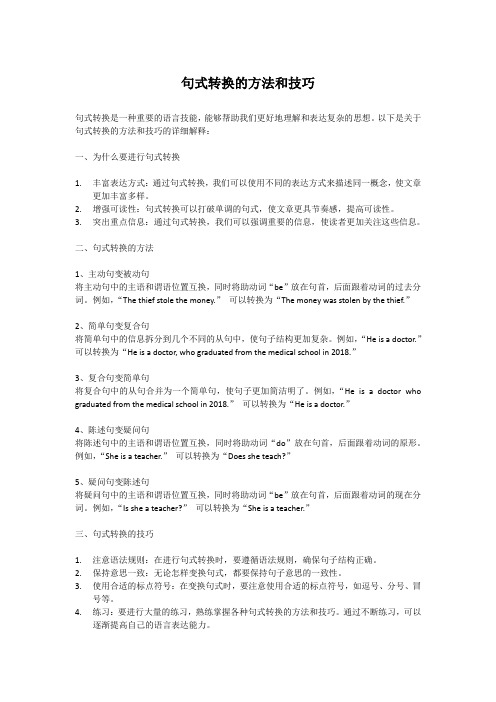
句式转换的方法和技巧句式转换是一种重要的语言技能,能够帮助我们更好地理解和表达复杂的思想。
以下是关于句式转换的方法和技巧的详细解释:一、为什么要进行句式转换1.丰富表达方式:通过句式转换,我们可以使用不同的表达方式来描述同一概念,使文章更加丰富多样。
2.增强可读性:句式转换可以打破单调的句式,使文章更具节奏感,提高可读性。
3.突出重点信息:通过句式转换,我们可以强调重要的信息,使读者更加关注这些信息。
二、句式转换的方法1、主动句变被动句将主动句中的主语和谓语位置互换,同时将助动词“be”放在句首,后面跟着动词的过去分词。
例如,“The thief stole the money.”可以转换为“The money was stolen by the thief.”2、简单句变复合句将简单句中的信息拆分到几个不同的从句中,使句子结构更加复杂。
例如,“He is a doctor.”可以转换为“He is a doctor, who graduated from the medical school in 2018.”3、复合句变简单句将复合句中的从句合并为一个简单句,使句子更加简洁明了。
例如,“He is a doctor who graduated from the medical school in 2018.”可以转换为“He is a doctor.”4、陈述句变疑问句将陈述句中的主语和谓语位置互换,同时将助动词“do”放在句首,后面跟着动词的原形。
例如,“She is a teacher.”可以转换为“Does she teach?”5、疑问句变陈述句将疑问句中的主语和谓语位置互换,同时将助动词“be”放在句首,后面跟着动词的现在分词。
例如,“Is she a teacher?”可以转换为“She is a teacher.”三、句式转换的技巧1.注意语法规则:在进行句式转换时,要遵循语法规则,确保句子结构正确。
句子转换有哪些方法和技巧
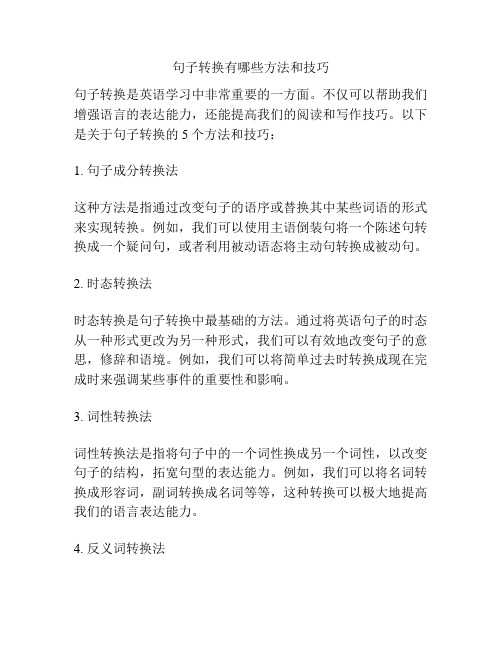
句子转换有哪些方法和技巧
句子转换是英语学习中非常重要的一方面。
不仅可以帮助我们增强语言的表达能力,还能提高我们的阅读和写作技巧。
以下是关于句子转换的5个方法和技巧:
1. 句子成分转换法
这种方法是指通过改变句子的语序或替换其中某些词语的形式来实现转换。
例如,我们可以使用主语倒装句将一个陈述句转换成一个疑问句,或者利用被动语态将主动句转换成被动句。
2. 时态转换法
时态转换是句子转换中最基础的方法。
通过将英语句子的时态从一种形式更改为另一种形式,我们可以有效地改变句子的意思,修辞和语境。
例如,我们可以将简单过去时转换成现在完成时来强调某些事件的重要性和影响。
3. 词性转换法
词性转换法是指将句子中的一个词性换成另一个词性,以改变句子的结构,拓宽句型的表达能力。
例如,我们可以将名词转换成形容词,副词转换成名词等等,这种转换可以极大地提高我们的语言表达能力。
4. 反义词转换法
反义词转换法是利用英语中的反义词来改变句子的意思或强调一些特殊的情况。
例如,我们可以将肯定句转换成否定句,或者将某些词汇的意思与其反义词相结合,来扩大想表达的意思。
5. 并列句转换法
并列句转换是将两个句子合并成单一的句子,这种方法在语篇中常常被用来调整句子的长度和结构,以及平衡整个句子的表达和内容。
例如,我们可以使用并列连接词来连接两个相互独立句子,如and, but, or等等。
总之,句子转换是英语学习中非常重要的一方面,并且在各种考试中也时常会出现。
通过掌握以上5种方法和技巧,我们可以更好地理解句子结构,改善表达效果,并提高阅读和写作能力。
句子的转换有多少种类型的方法

句子的转换有多少种类型的方法句子是人们在交流中使用的最基本的语言单位,它由主语、谓语、宾语、定语和状语等要素构成。
在语文学习中,句子转换是一项非常重要的技能,它不仅可以帮助我们掌握语言的表达能力,还可以提高我们的语文水平。
本文将会探讨句子的转换有多少种类型的方法,并且列举三个例子,写700字,以此帮助学生更好地掌握句子转换技巧。
句子的转换有很多种类型的方法,下面我们将会介绍其中的六种。
1. 句型转换句型转换是句子转换的最基本方法,它是将一个句子的结构转化为另一个句型的结构,从而增强句子的表达效果。
例如:原句:小明正在做作业。
句型转换:作业正在被小明做着。
这个例子中,我们将原句子中的主语“小明”变为被动语态的主语,同时将谓语“正在做”改为被动语态的谓语“正在被做着”。
2. 词性转换词性转换是指将一个词的词性从一种转换为另一种,以达到改变句子意思的目的。
例如:原句:猫在桌子上睡觉。
词性转换:在桌子上,猫睡觉。
这个例子中,我们将原句子中的“在”、“上”这两个介词转化为副词的形式,放到了句首,从而表达出在桌子上猫睡觉的情况。
3. 反义转换反义转换是指将原本一个句子的含义发生反转。
例如:原句:那个男孩非常高兴。
反义转换:那个男孩非常不幸。
这个例子中,我们将原句子中的“高兴”一词反义成“不幸”,突出了语言表达的反差效果。
以上是句子转换中的三种方法,下面我们再来看看另外三种方法。
4. 转换时态转换时态是指将一个句子的时态从一种转换为另一种,以达到改变句意的目的。
例如:原句:昨天早上我在打电话。
转换时态:明天早上我将在打电话。
这个例子中,我们将原句子中的“昨天”和“现在”全部改为“将来”,从而表达明天早上我将会打电话,这样更加准确地传达了信息。
5. 转换语气转换语气是指将一个句子的语气从一种转换为另一种,以达到改变句意的目的。
例如:原句:今年的科技进步非常快。
转换语气:今年的科技进步并非快。
这个例子中,我们将原句子中的肯定语气转化为否定语气,突出了“非常”这个程度副词的加强效果。
句法变换的五种基本方式
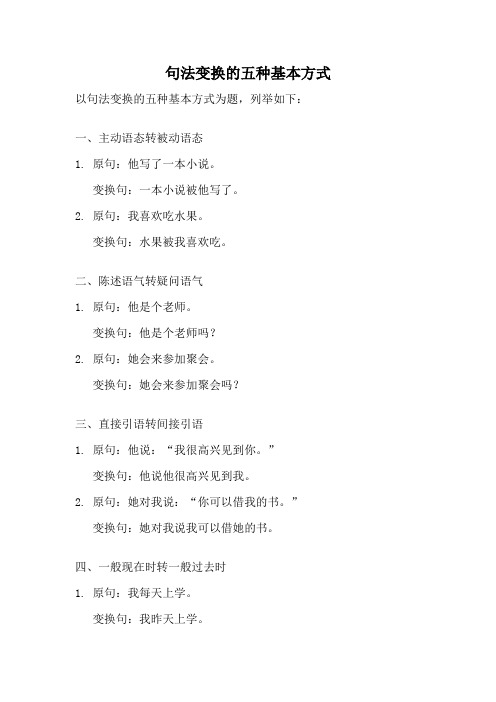
句法变换的五种基本方式以句法变换的五种基本方式为题,列举如下:一、主动语态转被动语态1. 原句:他写了一本小说。
变换句:一本小说被他写了。
2. 原句:我喜欢吃水果。
变换句:水果被我喜欢吃。
二、陈述语气转疑问语气1. 原句:他是个老师。
变换句:他是个老师吗?2. 原句:她会来参加聚会。
变换句:她会来参加聚会吗?三、直接引语转间接引语1. 原句:他说:“我很高兴见到你。
”变换句:他说他很高兴见到我。
2. 原句:她对我说:“你可以借我的书。
”变换句:她对我说我可以借她的书。
四、一般现在时转一般过去时1. 原句:我每天上学。
变换句:我昨天上学。
2. 原句:他常常去图书馆。
变换句:他经常去图书馆。
五、肯定句转否定句1. 原句:我喜欢吃苹果。
变换句:我不喜欢吃苹果。
2. 原句:他会来参加聚会。
变换句:他不会来参加聚会。
六、选择疑问句转陈述句1. 原句:你喜欢喝茶还是咖啡?变换句:你喜欢喝茶,不喜欢喝咖啡。
2. 原句:他是去还是留?变换句:他是去,不是留。
七、表语转状语1. 原句:他很高。
变换句:他站得很高。
2. 原句:她很快乐。
变换句:她笑得很快乐。
八、并列句转复合句1. 原句:我喜欢读书,我也喜欢旅行。
变换句:我喜欢读书,而且我也喜欢旅行。
2. 原句:他去了超市,买了一些水果。
变换句:他去了超市,然后买了一些水果。
九、插入语转定语从句1. 原句:我去年,参加了一个音乐比赛。
变换句:我去年参加了一个音乐比赛的活动。
2. 原句:这是一个很好吃的蛋糕。
变换句:这是一个很好吃的蛋糕店里的蛋糕。
十、条件状语从句转为时间状语从句1. 原句:如果你不来,我就一个人去。
变换句:当你不来时,我就一个人去。
2. 原句:如果下雨,我们就不出去玩。
变换句:当下雨时,我们就不出去玩。
以上是以句法变换的五种基本方式为题所列举的例子,希望对您有所帮助。
什么是句子的句型转换方法

什么是句子的句型转换方法文章一:什么是句子的句型转换方法?句子是语言交流的基本单位,它由词语按照特定顺序组成,用于表达完整的语义意义。
而句型转换是指在语法框架不变的情况下将原句型转换成不同的结构,以达到更加准确、简洁的表达的一种方法。
那么,要进行句型转换,我们需要掌握什么知识呢?一、句子成分的转换句子成分是指句子中构成句子的单词、短语和从句等的分类,包括主语、谓语、宾语、定语、状语和补语六大成分。
进行句型转换时,可以试着将某个成分转换成另一个成分的形态,这样可以使个别成分达到较好的表达效果,提高句子的表达水平。
比如,原句“我喜欢听音乐。
”可以通过将“我”转换成“一个音乐迷”,来达到转换的效果:“一个音乐迷喜欢听音乐。
”二、句型结构的转换句型结构转换指的是改变句子中不同成分的组合方式,以达到更好的表达效果。
语言学家们根据句子的结构和成分分类出了多种句型结构,如简单句、并列句、复合句等,并通过各自的特点和使用方法,在句子表达中发挥着不可替代的作用。
例如,原句“他去了学校,然后去买了本书。
”可以通过将并列关系转换成条件关系的形式,来让句子更加清晰简洁:“由于他去了学校,所以他买了本书。
”三、语法形态的转换语法形态的转换主要是指通过从定语、插入语等手段增添或者削减句子中的部件,以为句子增加信息或者精简句子。
例如,原句“他是一个老师”可以通过增加限定词“那个”的方式来改造成“那个老师”,从而增加信息量。
总之,句型转换不仅是有效的表达方式,更是语言学习的必备技能之一。
了解句子成分、结构,熟悉语法形态,灵活运用,才能在口语、写作、翻译等方面更有效地表达自己的想法和意义。
文章二:句型转换的具体方法有哪些?句型转换是现代语言学研究中的重要内容之一,它是为了达到更准确、简洁的表达,以及更好的语言表达效果而设计的方法。
那么,具体如何进行句型转换呢?以下是几个具体的方法。
一、通过词语的变换来改变句子结构语言学家们指出,通过词语的替换、变换等手段来进行句子结构的变化是最常用的句型转换方法之一。
句子转换的方法和技巧
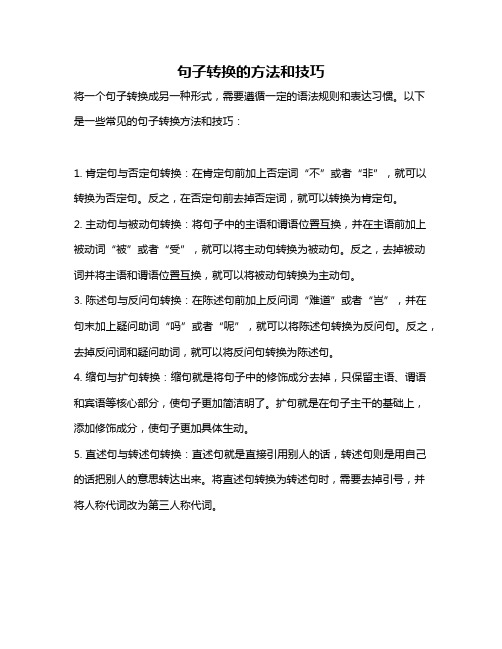
句子转换的方法和技巧
将一个句子转换成另一种形式,需要遵循一定的语法规则和表达习惯。
以下是一些常见的句子转换方法和技巧:
1. 肯定句与否定句转换:在肯定句前加上否定词“不”或者“非”,就可以转换为否定句。
反之,在否定句前去掉否定词,就可以转换为肯定句。
2. 主动句与被动句转换:将句子中的主语和谓语位置互换,并在主语前加上被动词“被”或者“受”,就可以将主动句转换为被动句。
反之,去掉被动词并将主语和谓语位置互换,就可以将被动句转换为主动句。
3. 陈述句与反问句转换:在陈述句前加上反问词“难道”或者“岂”,并在句末加上疑问助词“吗”或者“呢”,就可以将陈述句转换为反问句。
反之,去掉反问词和疑问助词,就可以将反问句转换为陈述句。
4. 缩句与扩句转换:缩句就是将句子中的修饰成分去掉,只保留主语、谓语和宾语等核心部分,使句子更加简洁明了。
扩句就是在句子主干的基础上,添加修饰成分,使句子更加具体生动。
5. 直述句与转述句转换:直述句就是直接引用别人的话,转述句则是用自己的话把别人的意思转达出来。
将直述句转换为转述句时,需要去掉引号,并将人称代词改为第三人称代词。
在进行句子转换时,需要注意保持原意不变,同时要注意语法正确和表达清晰。
句子的转换有哪些形式和方法
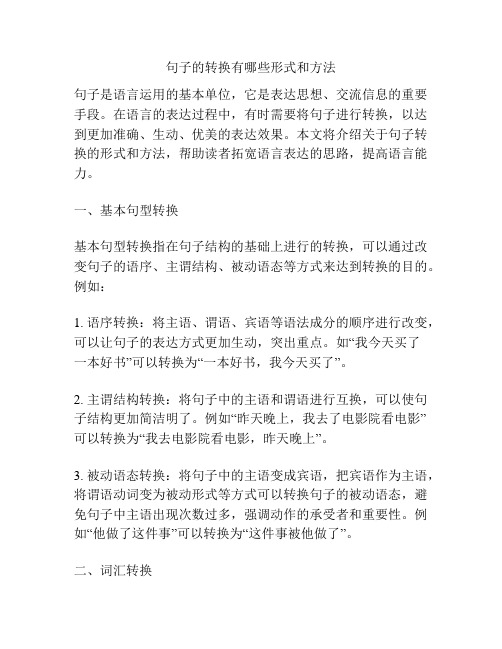
句子的转换有哪些形式和方法句子是语言运用的基本单位,它是表达思想、交流信息的重要手段。
在语言的表达过程中,有时需要将句子进行转换,以达到更加准确、生动、优美的表达效果。
本文将介绍关于句子转换的形式和方法,帮助读者拓宽语言表达的思路,提高语言能力。
一、基本句型转换基本句型转换指在句子结构的基础上进行的转换,可以通过改变句子的语序、主谓结构、被动语态等方式来达到转换的目的。
例如:1. 语序转换:将主语、谓语、宾语等语法成分的顺序进行改变,可以让句子的表达方式更加生动,突出重点。
如“我今天买了一本好书”可以转换为“一本好书,我今天买了”。
2. 主谓结构转换:将句子中的主语和谓语进行互换,可以使句子结构更加简洁明了。
例如“昨天晚上,我去了电影院看电影”可以转换为“我去电影院看电影,昨天晚上”。
3. 被动语态转换:将句子中的主语变成宾语,把宾语作为主语,将谓语动词变为被动形式等方式可以转换句子的被动语态,避免句子中主语出现次数过多,强调动作的承受者和重要性。
例如“他做了这件事”可以转换为“这件事被他做了”。
二、词汇转换词汇转换是指在句子中使用与原词不同的其他词汇,以改变句子的表述方式。
主要包括同义词替换、反义词替换、近义词替换、词性转换等方式。
如“天气炎热,我感到很燥热”可以转换为“天气炎热,我感到很闷热”。
三、句子类型转换句子类型转换是指通过对原句的结构、语言规则等进行调整,改变句子的类型,比如将陈述句改为问句、祈使句等,从而使句子的表达方式更加多样化。
例如将“他去了中国”改为“他去中国了吗?”即可将陈述句转换为问句。
四、句式转换句式转换是指通过改变句子的从句结构、修饰成分等方式,达到改变句子类型、降低重复性等效果。
例如将“她是一个年轻的女孩,她在学习英语”改为“学习英语的是一个年轻的女孩”,即将前面的主语“她”和谓语“是”省略,并将修饰语“年轻的女孩”移动到后面。
五、短语转换在短语转换中,我们可以将短语拆开或组合,改变语序或结构等方式,从而实现句子转换。
句子的转换有哪些类型和方法
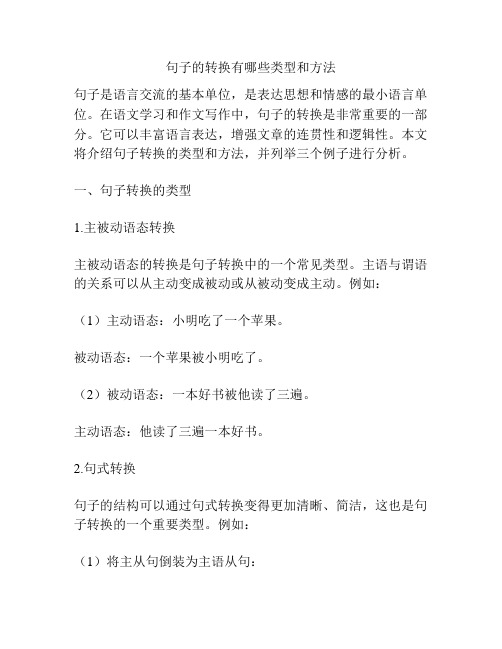
句子的转换有哪些类型和方法句子是语言交流的基本单位,是表达思想和情感的最小语言单位。
在语文学习和作文写作中,句子的转换是非常重要的一部分。
它可以丰富语言表达,增强文章的连贯性和逻辑性。
本文将介绍句子转换的类型和方法,并列举三个例子进行分析。
一、句子转换的类型1.主被动语态转换主被动语态的转换是句子转换中的一个常见类型。
主语与谓语的关系可以从主动变成被动或从被动变成主动。
例如:(1)主动语态:小明吃了一个苹果。
被动语态:一个苹果被小明吃了。
(2)被动语态:一本好书被他读了三遍。
主动语态:他读了三遍一本好书。
2.句式转换句子的结构可以通过句式转换变得更加清晰、简洁,这也是句子转换的一个重要类型。
例如:(1)将主从句倒装为主语从句:倒装:今天下雨了,上学要带伞。
主语从句:要带伞的原因是今天下雨了。
(2)把句子拆成并列句或复合句:并列句:小明喜欢读书,他也爱看电影。
复合句:虽然天气很热,小朋友们依然在欢声笑语地玩耍。
3.语义转换语义转换是通过改变句子的表达方式,使其更具有表达能力和表现力。
例如:(1)用反义词转换:这个房间很暗 - 这个房间很亮。
(2)用同义词转换:这个人很聪明 - 这个人很机灵。
二、句子转换的方法1. 词汇替换词汇替换是句子转换的一个重要方法。
它可以使文章更加多样化和丰富,增强表达的深度和广度。
在词汇替换事项时,要考虑替换后的单词是否符合语境,是否有重复,是否合适等因素。
例如:(1)原句:我今天买了一个苹果。
替换为:我今天购置了一颗苹果。
(2)原句:别人都看不起他,只有我对他很好。
替换为:尽管他受欺凌,但我总是坚挺他。
2. 句型转换句型转换是句子转换的另一种方法。
它可以使文章比较丰富和有趣,同时还可以提高读者的体验感。
例如:(1)原句:老师正在给学生上课。
转换为:学生正在接受老师的知识讲解。
(2)原句:这个女孩长得很漂亮。
转换为:这位少女相貌秀雅。
3. 表达方式转换表达方式转换是句子转换的一种重要方法。
句法变换的五种基本方式

句法变换的五种基本方式1. 句子转换:将复杂的句子转换为简单句、并列句或从句,以增加句子的清晰度和易读性。
例如:原句 "The cat, which was black and white, sat on the mat." 可以转换为 "The cat was black and white. It sat on the mat."2. 主动语态转被动语态:将句子中的主动语态转换为被动语态,以改变句子的重点和语气。
例如:原句"The teacher gave the students a test." 可以转换为"The students were given a test by the teacher."3. 名词转换:将句子中的动词或形容词转换为名词,以减少动词或形容词的使用频率,并使句子更加简洁明了。
例如:原句 "He runs quickly." 可以转换为 "He has a quick run."4. 引用转述:将直接引用的内容转换为间接引用或转述,以避免重复使用相同的词语或句子。
例如:原句"She said, 'I love you.'" 可以转换为 "She expressed her love for him."5. 句型变换:将句子从陈述句变为疑问句、感叹句或条件句,以增加句子的多样性和趣味性。
例如:原句 "He is going to the store." 可以转换为"Is he going to the store?" 或"How amazing it is that he is going to the store!"6. 并列句转换为复合句:将并列句转换为复合句,以增加句子的连贯性和逻辑性。
各种句式的转换原创

倒装句的用法和表达效果
倒装句的定义:为了强调、突出等目的而颠倒原有语序的句式。
常见倒装句类型:主谓倒装、宾语前置、定语后置、状语前置等。
倒装句的表达效果:强调重点、突出情感、使语言更加生动有力。
倒装句在写作中的运用:适当运用倒装句可以增加语言的节奏感和音乐美感,使文章更 加生动有趣。
倒装句的转换技巧
各种句式的转换原创
汇报人:XX
目录
Contents
01 简 单 句 转 换 为 复 杂 句 02 复 杂 句 转 换 为 简 单 句 03 主 动 句 转 换 为 被 动 句 04 倒 装 句 转 换 05 省 略 句 转 换 06 强 调 句 转 换
01
简单句转换为复杂句
简单句转换为并列句
简单句:我喜欢读书。 并列句:我喜欢读书,也喜欢看电影。
确保简单句的语法正确,没有冗余或歧义。
03
主动句转换为被动句
将主动句变为被动语态
找到主动句中的宾语,将其变为 被动句的主语。
将主动句中的主语位置空出或用 其他词语代替。
添加标题
添加标题
将谓语动词变为被动形式,即 “be+过去分词”。
添加标题
添加标题
调整其他成分,确保句子语法正 确。
将主动语态变为被动语态的步骤
力。
强调句的用法和表达效果
强调句的定义和 结构
强调句的用法: 强调句用于突出 句子中的某个成 分,使其更加醒 目和突出
表达效果:强调 句能够引起听者 或读者的注意, 使信息更加清晰 和明确
转换方法:将普 通句式转换为强 调句式,可以通 过改变语序、添 加强调词或使用 强调句型来实现
强调句的转换技巧
强调句的常见形式和转换方 法
句型转换的句子有哪些类型
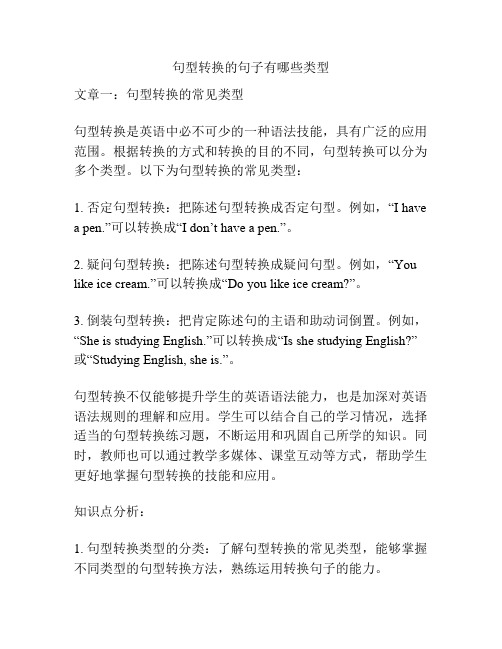
句型转换的句子有哪些类型文章一:句型转换的常见类型句型转换是英语中必不可少的一种语法技能,具有广泛的应用范围。
根据转换的方式和转换的目的不同,句型转换可以分为多个类型。
以下为句型转换的常见类型:1. 否定句型转换:把陈述句型转换成否定句型。
例如,“I havea pen.”可以转换成“I don’t have a pen.”。
2. 疑问句型转换:把陈述句型转换成疑问句型。
例如,“You like ice cream.”可以转换成“Do you like ice cream?”。
3. 倒装句型转换:把肯定陈述句的主语和助动词倒置。
例如,“She is studying English.”可以转换成“Is she studying English?”或“Studying English, she is.”。
句型转换不仅能够提升学生的英语语法能力,也是加深对英语语法规则的理解和应用。
学生可以结合自己的学习情况,选择适当的句型转换练习题,不断运用和巩固自己所学的知识。
同时,教师也可以通过教学多媒体、课堂互动等方式,帮助学生更好地掌握句型转换的技能和应用。
知识点分析:1. 句型转换类型的分类:了解句型转换的常见类型,能够掌握不同类型的句型转换方法,熟练运用转换句子的能力。
2. 句子成分的转换:句型转换时需要对句子中的不同成分进行变换。
了解句子中包括的成分及其在不同种类句子中的作用,能够更好地进行句型转换。
3. 英语语法规则:句型转换是基于英语语法规则的。
掌握英语语法规则能够帮助学生更深入地理解句型转换的本质和原则,提高句型转换的准确性和效率。
文章二:如何提高句型转换的能力句型转换是英语语法中的重要部分,也是英语学习中的难点之一。
如何提高句型转换的能力,让自己的英语水平更上一层楼呢?以下为几点建议:1. 提高英语词汇量:句型转换涉及到不同的英语语法成分,但其也与英语单词的词性、释义等相关。
提高英语词汇量可以更好地理解英语句子的含义和结构,从而更准确地转化句子。
什么是句子的句型转换

什么是句子的句型转换文章一:什么是句子的句型转换句子的句型转换指的是将一句话中单词的顺序或语法结构进行调整,从而改变句子的表达方式或语气的目的。
在英语中,句型转换是语言学习的一个重要方面,通过训练,学生可以有效提高英语表达的能力。
知识点一:主语和宾语的转换在句型转换中,主语和宾语的转换是最常见的形式之一。
主语通常是一个句子中最重要的成分之一,而宾语则是接受主语行为或动作的对象。
在转换句型时,可以通过变换主动和被动语态来改变主语和宾语的位置。
例如,原句为“I bought a book”,通过转换句型可以得到“A book was bought by me”。
知识点二:并列句和复杂句的转换并列句和复杂句也是句型转换中常用的形式。
并列句指的是单独使用两个或多个独立子句,而复杂句则由一个独立子句和一个或多个从属子句组成。
在转换句型时,可以将并列句转换成复合句。
例如,原句为“Tom likes to play basketball and he is good at it”,通过转换可以得到“Tom, who is good at playing basketball, lik es to play it”。
知识点三:形容词和副词的转换形容词和副词的转换也有助于提高英语表达能力。
形容词通常用于修饰名词,而副词则用于修饰动词、形容词和其他副词。
在句型转换中,可以通过将形容词转换成副词或者将副词转换成形容词来改变句子的表达方式。
例如,原句为“The car runs fast”,通过转换可以得到“The car is fast”。
总之,句型转换在英语学习中是一个非常重要的方面,通过掌握句型转换的知识点,可以有效提高英语的表达能力和口语表达的流利程度。
文章二:句子的句型转换及其重要性在英语学习中,句型转换是一个非常重要的方面。
通过句型转换,我们可以改变句子的表达方式、语气和结构,从而更好地表达我们的想法和思想。
语文句型转换方法

语文句型转换方法
语文句型转换,指的是将语文中的句子从一种形式转换为另一种形式,使其表达方式更加多样化和灵活。
以下是一些常见的语文句型转换方法:
1. 主谓结构转换为倒装结构:
原句:他在操场上跑步。
倒装结构:在操场上跑步的是他。
2. 主谓结构转换为被动语态:
原句:杰克吃了苹果。
被动语态:苹果被杰克吃了。
3. 肯定句转换为否定句:
原句:他每天都看书。
否定句:他每天都不看书。
4. 陈述句转换为疑问句:
原句:他是一位医生。
疑问句:他是一位医生吗?
5. 肯定句转换为感叹句:
原句:今天天气真好!
感叹句:今天的天气真好啊!
6. 直接引语转换为间接引语:
原句:小明说:“我喜欢吃巧克力。
”
间接引语:小明说他喜欢吃巧克力。
7. 使用虚拟语气:
原句:要是我有时间,我就去看电影。
虚拟语气:要是我有时间,我就去看电影了。
8. 简单句转换为复合句:
原句:我今天去了图书馆。
复合句:我今天去了图书馆,想借几本书回来看。
9. 使用比较级和最高级:
原句:这本书很好看。
比较级:这本书比那本更好看。
最高级:这本书是我看过的最好看的。
10. 使用省略句:
原句:我喜欢吃冰激凌,(而)且我喜欢巧克力口味的。
省略句:我喜欢吃冰激凌,且喜欢巧克力口味的。
以上是关于语文句型转换的一些常见方法,通过句型转换,可以让语文表达更加灵活多样,增强语言的表达能力。
句子转换有哪些类型的句子
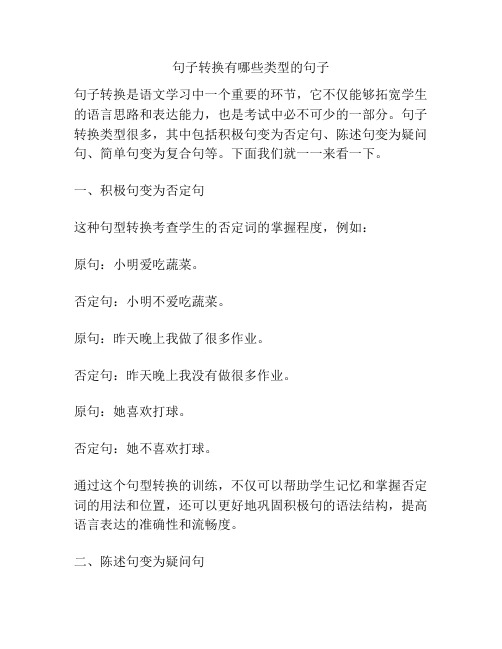
句子转换有哪些类型的句子句子转换是语文学习中一个重要的环节,它不仅能够拓宽学生的语言思路和表达能力,也是考试中必不可少的一部分。
句子转换类型很多,其中包括积极句变为否定句、陈述句变为疑问句、简单句变为复合句等。
下面我们就一一来看一下。
一、积极句变为否定句这种句型转换考查学生的否定词的掌握程度,例如:原句:小明爱吃蔬菜。
否定句:小明不爱吃蔬菜。
原句:昨天晚上我做了很多作业。
否定句:昨天晚上我没有做很多作业。
原句:她喜欢打球。
否定句:她不喜欢打球。
通过这个句型转换的训练,不仅可以帮助学生记忆和掌握否定词的用法和位置,还可以更好地巩固积极句的语法结构,提高语言表达的准确性和流畅度。
二、陈述句变为疑问句这种句型转换是在平时语文学习中最为常见的,它既检验了学生对疑问句的掌握程度,也促进了学生语法知识的运用。
例如:原句:他正在玩游戏。
疑问句:他在做什么?原句:这是我妈妈做的菜,很好吃。
疑问句:这是谁做的菜?好吃吗?原句:昨天下午我去了图书馆。
疑问句:你昨天下午去哪里了?通过学生的这些转换练习,他们能够更好地了解疑问句的语法和用法,同时也能拓宽他们的语言思路,在交流中更加流利自如。
三、简单句变为复合句这种句型转换考查学生的语句缩写能力和语言思维能力,通过这种转换练习,学生可以提高自己的语言表达能力,例如:原句:我喜欢红色。
复合句:我喜欢的颜色是红色。
原句:小明跳得很高。
复合句:小明跳得很高,大家都看到了。
原句:他学习很努力。
复合句:因为他知道学习很重要,所以他很努力。
通过上述句型转换的训练,我们能够提高学生的语法知识运用水平和语言思维能力,帮助学生更好地理解和运用语文知识,从而在成长过程中成为一个优秀的语言表达者。
综上所述,句子转换是语文学习中不可缺少的环节,它不仅能够帮助学生扩大语言思路和提高语言表达能力,还是成为语文优秀学生的必经之路。
我们也应该在实践中多加练习,让句子转换成为我们语言表达的妙法,熟练掌握后,我们就可以在各种交流场合中展露自己的语言表达魅力了。
句子转换类型大全

句子转换类型大全一、主动句与被动句转换这可是句子转换里的一个大类型哦。
主动句呢,就像一个勇敢的战士主动出击,强调动作的执行者。
比如说“我吃了那个苹果”,“我”就是主动做事的人。
被动句就反过来啦,像是那个苹果被我吃了,重点变成了动作的承受者。
你想啊,在有些情况下,你想强调那个苹果的遭遇,就会用被动句。
这就好比一个东西被欺负了,你想让大家关注它的遭遇,就用被动句呗。
二、陈述句与反问句转换陈述句平平常常地叙述一件事,就像一个老实人在讲述事实。
比如“他是个好人”。
反问句可就有劲儿多了,像是在挑衅或者强调。
“他难道不是个好人吗?”哇,这么一说,就有一种强烈的肯定情绪在里面了。
这就像你很相信一个人的时候,你不用平淡地说,而是用反问句来表示你的坚信,就像在对那些怀疑的人说“哼,你们怎么能不相信呢?”三、肯定句与否定句转换肯定句是直截了当地给个肯定的说法,像“这个蛋糕很好吃”。
否定句呢,就是在句子里加上否定词,变成“这个蛋糕不难吃”。
有时候,否定句有一种委婉的感觉。
就好比你不太想直接夸这个蛋糕特别好吃,就用否定句来表示一种还不错的态度。
这就像你对一个人感觉还可以,但又不想太热情,就用这种比较含蓄的说法。
四、把字句与被字句转换把字句就像是你手里拿着个东西,然后对它做动作。
例如“我把书放在桌子上”,感觉“我”对“书”有掌控力。
被字句就像书被我放在桌子上,强调的是书的状态变化。
这就像两个人在抢一个东西,把字句是一方在主动操作,被字句就是另一方在描述这个东西被操作后的结果。
五、直述句与转述句转换直述句就是直接说某人说的话,像小明说:“我今天很开心。
”转述句就是把别人的话转达出来,变成小红说小明今天很开心。
这就像一个传话筒的游戏,你要把一个人的话准确地传给另一个人。
要是传错了,那可就乱套了,就像你把小明的开心变成了难过传达出去,那肯定不行啦。
六、缩句与扩句转换缩句就像给句子减肥,把那些多余的修饰成分去掉,只留下最核心的部分。
句子转换有哪些方法

句子转换有哪些方法文章一:句子转换方法句子转换是英语学习中的一种重要的技能,它的实际应用十分广泛,能够帮助学生更好地理解英语语言的语法和结构,扩大其语言知识积累。
在实际学习过程中,有哪些句子转换方法呢?1.改变语序改变语序是句子转换的一种常见方法。
英语语序通常是主语+谓语+宾语的顺序,但是为了强调不同的部分,语序可以发生变化,例如改变谓语和宾语的顺序,就可以实现句子转换的目的。
例如:I like to eat pizza. → To eat pizza is what I like.2.句型转换句型转换通常是根据语法结构的不同,将一种句子类型转化成另一种句子类型。
例如,将一般疑问句转换成反义疑问句、将陈述句转换成感叹句等。
这种方法要求学生熟练掌握英语不同的句型结构,注重语言的细节和语序的使用,采用合适的转换方式,避免语义转换的错误。
例如:He is a teacher. → What a great teacher he is!3.词类转换词类转换是指将一种词类转换成另一种词类,这种方法要求学生熟练掌握英语的词汇和词性,能够准确地认识单词的搭配和用法,了解不同词类的词形和用法。
例如,将名词转换成动词、将形容词转换成副词等,这种转换能够增加词汇量和理解力,提高语言表达的准确性和流畅性。
例如:He is a fast runner. → He runs fast.以上是几种常见的句子转换方法,但是不同的方法适用于不同的语言环境和学习阶段,在学习过程中应灵活运用,加强练习,逐步提升语言水平。
文章二:句子转换技巧句子转换是英语学习中的一项重要技巧,它有助于学生更好地理解英语语法和结构,扩大词汇量和提高语言表达的准确性。
在实际学习中,句子转换技巧可以帮助学生更好地理解和应用英语语言,例如:1.注意词性的变化在句子转换中,学生需要注意单词的词性变化,例如将名词变为形容词、将动词变为名词等。
熟悉英语单词的不同词性,使学生能够更好地理解单词的搭配和用法,提高句子表达的准确性和流畅性。
初中英语语法大全:句型转换

Ⅰ.题型介绍所谓“句型转换”就是先给⼀个完整的句⼦A,再根据括号内的要求(有时没有明确,须⾃⼰观察),在第⼆个句⼦B的空⽩处填上适当的词来完成的句型转换。
Ⅱ.题型分类从形式上看,有如下⼏种形式:①某⼀词或词组的转换;②词组与句⼦的转换;③同义句型的转换;④为纠正常犯语⾔错误⽽设计的题⽬。
从内容上看,此题型涉及的⾯较⼴,主要有:①句⼦功能⽅⾯的转换。
包括陈述句(肯定与否定)、四种题疑问句、祈使句、感叹句的转换;②句⼦结构⽅⾯的转换。
即简单句、复合句、并列句之间的转换;③语态的转换。
即主动语态与被动语态之间的转换;④常⽤句型与词汇⼿段的转换。
Ⅲ.具体分类如下⼀、陈述句与疑问句、祈使句、感叹句间的转换1、陈述句中肯定句变为否定句,⼤部分是⽤not来改变谓语结构,但也有借⽤否定意义的词,如nothing, nobody, none, neither, little, few, never, hardly等,例如::A:Tom does well in maths.B:Tom doesn't do in maths.A:He has much to do.B:He has nothing to do.A:All of my classmates like art.B:None of my classmates likes art.2、改为疑问句。
根据上下句的结构和词的减少,来判断变为哪⼀种形式的疑问句。
例如:A:My brother often has breakfast at school.B: Does your brother often have breakfast at school?A:Tom's already weak in English.B:Tom's already weak in English, isn't he ?A:The red light changes every two minutes.B:How often does the red light change?3、改为感叹句。
- 1、下载文档前请自行甄别文档内容的完整性,平台不提供额外的编辑、内容补充、找答案等附加服务。
- 2、"仅部分预览"的文档,不可在线预览部分如存在完整性等问题,可反馈申请退款(可完整预览的文档不适用该条件!)。
- 3、如文档侵犯您的权益,请联系客服反馈,我们会尽快为您处理(人工客服工作时间:9:00-18:30)。
句型转换1、陈述句中肯定句变为否定句,大部分是用not来改变谓语结构,但也有借用否定意义的词,如nothing, nobody, none, neither, little, few, never, hardly等。
例如:1) A:Tom does well in maths.B:Tom doesn’t do well in maths.2) A:He has much to do.B:He has nothing to do.3) A:All of my classmates like art.B:None of my classmates likes art.2、改为疑问句。
根据上下句的结构和词的减少,来判断变为哪一种形式的疑问句。
例如:1) A:My brother often has breakfast at school.B:Does your brother often have breakfast at school?2) A:Tom’s already weak in English.B:Tom’s already weak in English, isn’t he ?3) A:The red light changes every two minutes.B:How often does the red light change?3、改为感叹句。
根据所给的句子结构和单词的词性,来确定使用哪一种感叹的形式,例如:1)A:This is an interesting book.B:What an interesting book this is!或 How interesting this book is!4、同义词或词组之间的转换。
(通常上下句时态保持一致)。
常见的同义词或词组有:1)“花费”spend—take—cost—take;2)“到达”get to—reach—arrive in/at;3)“收到…来信”hear from—get a letter from—receive a letter from—have a letter from4)“擅长于…”be good at —do well in5)“有空”be free—have time;6)“入睡”go to sleep—get to sleep—fall asleep;7)“玩得开心”enjoy oneself—have a good time;8)“给…打电话”call sb—telephone sb—ring sb. a call—make a telephone to sb.9)“飞往…”fly to…—go to…by air/plane10)“自学”teach oneself—learn…by oneself11)“在…方面帮助”help…with…—help…(to)do…12)“在…差”be weak in…—do badly in…13)“能/会”can—be able to14)“更喜欢”like…better than…—prefer…to…15)“充满了”be full of…—be filled with…16)“放弃做某事”give up doing…—stop doing…17)“不再” no longer—not …any longer18)“照顾/保管” take care of…—look after19)“展览” on show—on display20)“阻止…干…”stop…from doing—keep/prevent…from doing…21)“由于” thanks to—because of…22)“举手”hands up—put up one’s hands23)“最后,终于”at last—in the end24)“与…不同” be different from…—be not the same as…25)“从…借入…”borrow…from…—lend…to…26)“乘公汽/火车/的” go to…by bus/train/taxi—take a bus /train to27)“乘自行车去…” go to…by bike—ride a bike to…28)“为…感到自豪” be proud of…—be the pride of…29)“步行去…” walk to…—go to…on foot30)“独自地”by oneself —alone等。
例如:A:The children had a good time in the park.B:The children enjoyed themselves in the park.2、同义句型之间的转化。
常见的同义句型如下:1)It seems that 从句→Somebody seems(to be)+adj/n2)It’s kind of sb. to do…→Somebody is kind to do…3)What does…mean?→What do you mean by…?或What’s the meaning of…?4)There is something wrong with…→Something is wrong with…5)not…until…与when/after/before引导的时间状语从句的转换6)What’s wrong with…?→What’s the matte with…?7)How is…?→What’s…like…?8)How do you like…?→What do you think of?9)It’s time that…→It’s time for sb. to do…10)It’s said that…→People say that…11)Can I help you? →What can I do for you?例如: A:I went to bed after I finished my homework.B:I didn’t go to bed until I finished my homework.3、if引导的条件状语从句的转化。
例如: 1)A:If it doesn’t rain tomorrow, they’ll go to the park.B:Unless it rains tomorrow, they’ll go to the park.2)A:If you don’t hurry, you’ll be late.B:Hurry up, or you’ll be late.3)A:Fish can’t live if there is no water.B:Fish can’t live without water.4、现在完成时态中的一句多译。
在现在完成时态中,结束性动词不能与时间段连用,必须改成相应的延续性动词。
常见的动词转换有:buy—have, borrow—keep, die—be dead, open—be open,join—be in+组织/be a +成员,begin—be on, leave—be away from, close—be closed, arrive in/ get to/ come/go to—be in/at,finsh—be over, go to sleep—be asleep,get up—be up.例如:A:The old man died five months ago.B:The old man has been dead since five months ago.The old man has been dead for five months.It’s five months since the old man died.Five months has passed since the old man died.5、简单句与复合句之间的转换。
1)含宾语从句的复合句与简单句的转换。
例如:1)A:I saw they were playing football on the playground.B:I saw them playing football on the playground.2)A:The teacher found that she was very clever.B:The teacher found her very clever.3)A:He found that it was hard to learn English well.B:He found it hard to learn English well.4)A:We are sure that we will win to first match.B:We are sure to win to first match.由疑问代词/副词引导的宾语从句可转化为“疑问句+不定式”结构。
例如:1)A:Could you tell me how I can get to the railway station?B:Could you tell me how to get to the railway station?2)A:We don’t know what we should do next.B:We do n’t know what to do next.2)由when/after/before/while/since/until引导的时间状语从句可转化为when/after/before/while/sine/until + doing…例如:1)A:They went home after they finished their work.B:They went home after finishing their work.2) A:Mr Smith has taught English since he came to China.B:Mr Smith has taught English since coming to China.3)When sb. +be+数词+years old→at the age of+岁数A:When he was twelve years old,Edison started writing his own newspaper. B:At the age of twelve, Edison started writing his own newspaper.4)由so…that…引导的结果状语从句可转化为too…to do或…enough to d o……例如:1)A:The box is so heavy that I can’t carry it.B:The box is too heavy for me to carry.或:The box isn’t light enough for me to carry.2)A:The child is so old that he can go to school.B:The child is old enough to go to school.5)由so that 引导的目的状语从句可转化为in order to do例如:A:My father got up early this morning so that he could catch the early bus. B:My father got up early this morning in order to catch the early bus.6)由because 引导的原因状语从句可转化为because of…例如: A:We didn’t go to the park because it rained.B:We didn’t go to the park because of the rain.7)定语从句可以转化为介词短语或分词短语。
